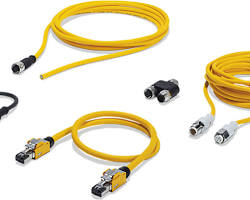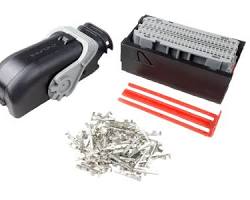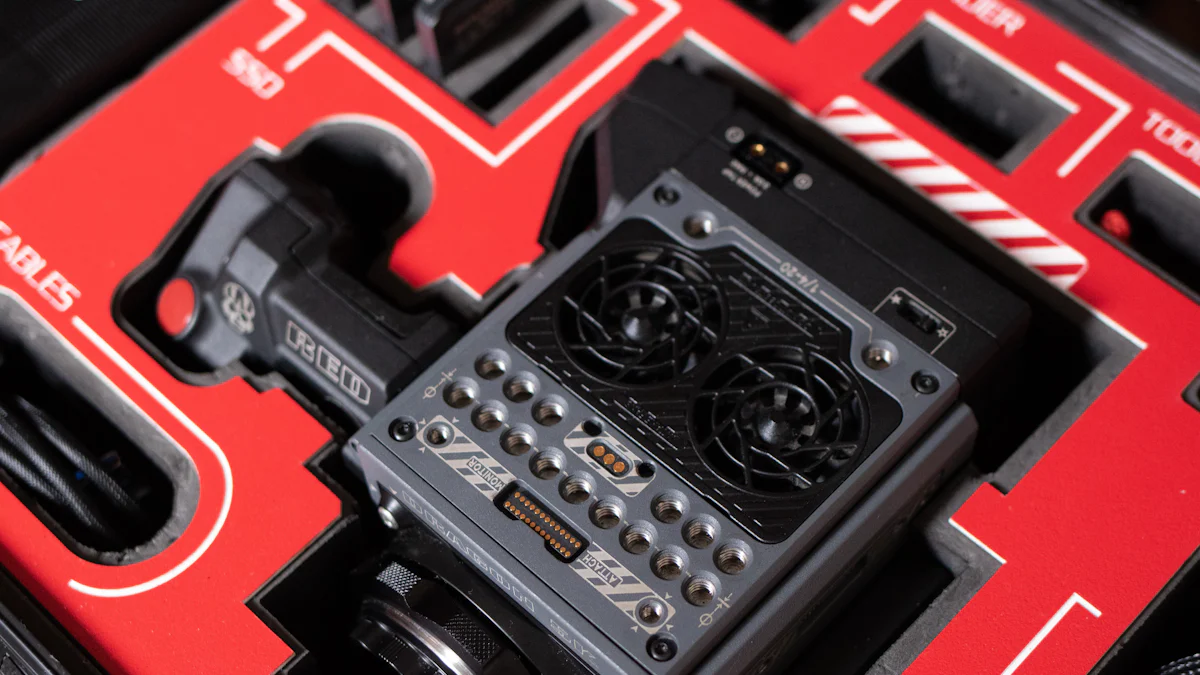The reliability and applications of modular connectors in industrial automation.

In the realm of industrial automation, reliability and efficiency are paramount for seamless operations. As the industrial automation top choice, modular connectors excel in providing the durability and adaptability required to withstand even the harshest conditions. These connectors, including the widely used RJ45 modular connector, play a critical role in streamlining communication, power distribution, and data transfer. Their robust design ensures consistent performance, making them indispensable in modern automation systems. By incorporating modular connectors, you not only enhance system efficiency but also minimize downtime, solidifying their position as the preferred solution in industrial automation.
Key Takeaways
Modular connectors offer exceptional reliability and adaptability, making them ideal for harsh industrial environments.
Their customizable configurations allow for tailored solutions, enhancing system efficiency and scalability.
Using durable modular connectors minimizes downtime and ensures uninterrupted operations, even in high-vibration settings.
Compatibility with industrial standards simplifies installation and maintenance, reducing operational disruptions.
Investing in modular connectors is cost-effective, as their durability lowers long-term maintenance expenses.
Regular maintenance and careful selection of connectors are crucial for optimizing performance and longevity in industrial applications.
Modular connectors support diverse applications, from power distribution to data transmission, ensuring seamless communication across systems.
Key Features Enhancing the Reliability of Modular Connectors

Modularity and Customization
Modular connectors stand out for their ability to adapt to diverse industrial needs. You can configure these connectors to meet specific requirements, whether for power distribution, data transfer, or communication. This flexibility allows you to design systems that align perfectly with your operational goals. For instance, Positronic connectors offer customizable configurations based on voltage, current, and circuit size, giving engineers the freedom to create tailored solutions. Similarly, the heavymate® series supports various contact arrangements and shell sizes, making it ideal for dynamic manufacturing environments. By choosing modular connectors, you gain a versatile tool that simplifies system upgrades and modifications, ensuring your setup evolves with technological advancements.
Durability and Resistance to Harsh Conditions
Industrial environments demand connectors that can endure extreme conditions. Modular connectors excel in this aspect, offering robust designs that resist wear and tear. Many connectors feature advanced sealing and ingress protection, safeguarding them against dust, moisture, and other contaminants. For example, the heavymate® series is built to withstand harsh conditions, ensuring reliable performance in demanding applications. These connectors also incorporate electromagnetic shielding, which protects against interference and maintains signal integrity. By using durable modular connectors, you ensure uninterrupted operations, even in challenging settings.
Compatibility with Industrial Standards
Standardization plays a crucial role in industrial automation. Modular connectors are designed to comply with industry standards, ensuring seamless integration into existing systems. This compatibility reduces installation time and simplifies maintenance. For example, Harting connectors are renowned for their user-friendly design and plug-and-play compatibility, making them a preferred choice for frequent connections and disconnections. Additionally, modular connectors like the RJ45 modular jack connector adhere to global standards, ensuring reliable performance in data and voice communication networks. By selecting connectors that meet industrial standards, you enhance system reliability and streamline operations.
Modular Connector Applications in Industrial Automation

Robotics and Automated Systems
In robotics and automated systems, modular connectors play a vital role in ensuring seamless communication and power delivery. These connectors enable you to establish reliable connections between robotic arms, sensors, and controllers. Their modularity allows you to customize configurations for specific robotic tasks, enhancing precision and efficiency. For example, the RJ45 modular connector is widely used in robotic systems for data transmission, ensuring uninterrupted communication in high-speed operations. Modular connectors also excel in high-vibration environments, making them ideal for dynamic robotic applications. By integrating these connectors into your robotic systems, you can achieve greater operational reliability and adaptability.
Assembly Lines and Manufacturing
Assembly lines and manufacturing processes demand robust and efficient connectivity solutions. Modular connectors meet these demands by providing durable and flexible connections for machinery and equipment. You can use these connectors to streamline power distribution and data transfer across complex manufacturing setups. Their compatibility with industrial standards simplifies installation and maintenance, reducing downtime. For instance, heavy-duty modular connectors are designed to withstand harsh conditions, ensuring consistent performance in assembly lines. By incorporating modular connectors into your manufacturing processes, you can enhance productivity and maintain seamless operations.
Power Distribution in Industrial Systems
Power distribution is a critical aspect of industrial automation, and modular connectors offer an efficient solution. These connectors enable you to distribute power reliably across various components and systems. Their advanced sealing and ingress protection ensure durability, even in challenging environments. Modular connectors also support multiple power configurations, allowing you to tailor solutions to your specific needs. For example, Positronic's true modular connectors provide unparalleled flexibility, enabling you to overcome limitations in power distribution systems. By using modular connectors for power distribution, you can ensure stable and efficient energy flow in your industrial setup.
Data Transmission and Networking
Data transmission and networking are essential components of industrial automation. Modular connectors provide reliable solutions for these critical functions. You can use them to establish secure and efficient connections in high-speed communication networks. Their design ensures stable data flow, even in environments with high electromagnetic interference. For example, RJ45 modular connectors, widely adopted in industrial settings, deliver consistent performance in transmitting data across automated systems.
The history of modular connectors highlights their importance in networking. In the 1970s, the U.S. Federal Communications Commission (FCC) introduced standards for interconnection using modular connectors, known as Registered Jacks (RJ). This standardization simplified networking setups and ensured compatibility across various systems. Today, modular connectors continue to support seamless integration in modern industrial networks.
Modular connectors excel in high-reliability systems, such as machine vision and automation networks. Their advanced shielding protects against signal degradation, ensuring uninterrupted communication. You can rely on these connectors to maintain data integrity in demanding applications. Additionally, their modularity allows you to customize configurations for specific networking needs, enhancing system adaptability.
The adoption of modular connector applications in networking has grown due to their proven performance and ease of use. Their simple design reduces installation time, making them a practical choice for complex industrial networks. For instance, Positronic's true modular connectors surpass traditional limitations, offering unparalleled flexibility for data transmission tasks. By integrating modular connectors into your networking systems, you can achieve efficient and reliable communication across all components.
Benefits of Modular Connectors in Industrial Automation
Improved Efficiency and Reduced Downtime
Modular connectors enhance the efficiency of your industrial systems by simplifying installation and maintenance. Their solderless assembly design allows you to connect components quickly, reducing the time required for setup. This feature proves invaluable during system upgrades or repairs, where minimizing downtime is critical. For example, the RJ45 modular jack connector offers a plug-and-play solution, ensuring seamless integration into your existing network.
The ruggedized versions of modular connectors ensure reliable performance even in high-vibration environments. This reliability minimizes unexpected failures, helping you maintain uninterrupted operations. By choosing modular connectors, you can streamline workflows and focus on achieving your production goals without unnecessary delays.
Scalability and Flexibility for Evolving Systems
Industrial automation systems often require adaptability to meet changing demands. Modular connectors provide the flexibility you need to scale your operations efficiently. Their customizable configurations allow you to tailor solutions for specific applications, whether for power distribution, data transfer, or communication.
For instance, modular connectors like Positronic's true modular designs support multiple functions within a single unit. This versatility enables you to expand your system without overhauling the entire setup. You can easily add or modify connections as your requirements evolve, ensuring your system remains future-proof. Modular connectors empower you to adapt to technological advancements while maintaining operational consistency.
Cost-Effectiveness in Long-Term Operations
The cost-effectiveness of modular connectors makes them a preferred choice for industrial automation. Their off-the-shelf availability and ease of customization reduce initial procurement costs. Additionally, their durable construction minimizes the need for frequent replacements, lowering long-term maintenance expenses.
Integrated features like electromagnetic interference (EMI) shielding enhance connection reliability, reducing the risk of costly disruptions. Modular connectors also simplify system upgrades, saving you time and labor costs. By investing in modular connectors, you achieve a balance between performance and affordability, ensuring sustainable operations over time.
Challenges and Considerations When Using Modular Connectors
Selecting the Right Connector for Specific Needs
Choosing the correct modular connectors for your industrial systems requires careful evaluation. Each application has unique demands, such as power capacity, data transfer speed, or environmental resistance. You must assess these factors to ensure compatibility with your system. For example, connectors used in industrial controls need to meet specific standards for durability and reliability. Selecting a connector that aligns with your operational requirements prevents performance issues and reduces downtime.
When evaluating options, consider the connector's configuration flexibility. Modular connectors offer customizable designs, allowing you to tailor them to your system's needs. However, not all connectors provide the same level of adaptability. Researching product specifications and consulting with manufacturers can help you make informed decisions. By prioritizing compatibility and functionality, you can optimize your system's performance.
Maintenance and Replacement Challenges
Maintaining modular connectors is essential for ensuring long-term reliability. Over time, wear and tear can affect their performance, especially in high-vibration environments. Regular inspections help you identify potential issues before they escalate. Cleaning connectors to remove dust or debris also extends their lifespan. Neglecting maintenance can lead to connection failures, disrupting your operations.
Replacement can pose challenges, particularly when dealing with outdated or specialized connectors. Off-the-shelf availability simplifies this process, but you may encounter difficulties if your system uses rare configurations. To address this, keep spare connectors on hand for quick replacements. Modular connectors with solderless assembly designs further streamline the replacement process, reducing downtime during repairs.
Addressing Environmental Factors in Industrial Settings
Industrial environments often expose connectors to harsh conditions, such as extreme temperatures, moisture, or electromagnetic interference. Modular connectors designed for rugged applications can withstand these challenges. For instance, heavy-duty connectors feature advanced sealing and ingress protection, safeguarding them against contaminants. Choosing connectors with these protective features ensures consistent performance in demanding settings.
Environmental factors also influence the longevity of your connectors. High humidity or corrosive substances can degrade materials over time. To mitigate this, select connectors made from durable materials like stainless steel or reinforced plastics. Additionally, electromagnetic shielding protects against signal interference, maintaining data integrity in industrial controls. By addressing environmental considerations, you enhance the reliability of your modular connectors and reduce the risk of system failures.
Modular connectors have become the cornerstone of industrial automation, offering unmatched reliability and adaptability. Their robust design ensures they perform seamlessly in demanding environments, making them the go-to solution for engineers and technicians. You can rely on these connectors to support diverse applications, from power distribution to data transmission, while maintaining efficiency and scalability. By integrating modular connectors into your systems, you enhance operational consistency and reduce downtime. Their versatility and cost-effectiveness solidify their role as the top choice for advancing industrial automation technologies.
See Also
Top 11 Technology Trends Shaping The Connector Sector
Key Features Of Circular Connectors For Informed Decisions
Comparing Wago Connectors And Multi Wire Splice Options
Exploring Various Small Form Factor Pluggable Connector Types
